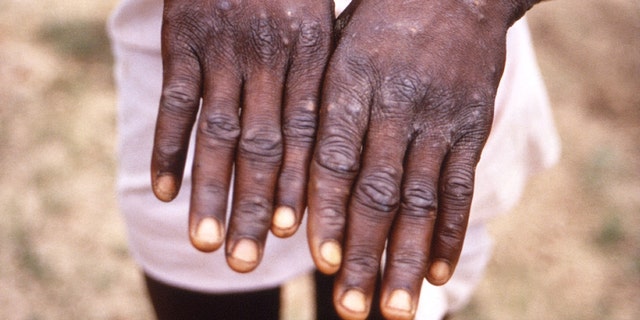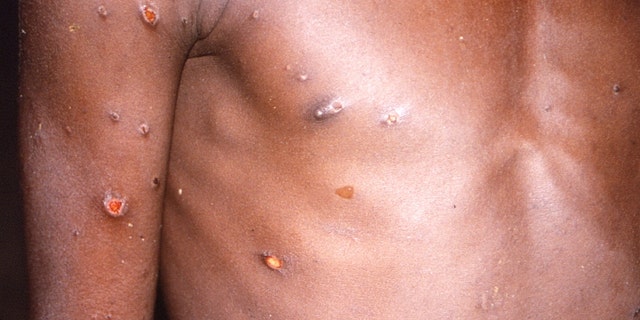Monkeypox: CDC investigating first US case of the year as growing clusters emerge globally outside Africa
While the United Kingdom has confirmed clusters of monkeypox infections and Spain and Portugal are both investigating suspected cases, the United States confirmed its first monkeypox infection of the year.
A Massachusetts man was diagnosed with the viral disease and is hospitalized at Massachusetts General Hospital in stable condition, according to a recent news briefing.
It is unclear if the U.S. case is linked to any of the cases abroad, but the patient did recently travel to Canada by car. Health officials in Quebec are investigating more than a dozen suspected monkeypox cases, according to a recent Canadian Broadcasting Corporation report.
“Given that we have seen now confirmed cases out of Portugal, suspected cases out of Spain, we’re seeing this expansion of confirmed and suspect cases globally. We have a sense that no one has their arms around this to know how large and expansive it might be,” said Jennifer McQuiston, deputy director of the Centers for Disease Control and Prevention’s (CDC) division of high consequence pathogens and pathology.
MASSACHUSETTS CONFIRMS FIRST MONKEYPOX CASE IN UNITED STATES THIS YEAR
“And given how much travel there is between the United States and Europe, I am very confident we’re going to see cases in the United States.”
Portugal reported more than 20 suspected cases of the infection this month, including five cases confirmed by the National Institutes of Health Dr. Ricardo Jorge Tuesday, per a press release. The cases were all mostly young males who developed ulcerative lesions.
Since early May 2022, the United Kingdom has identified nine cases of monkeypox. Only its first case involved recent travel to Nigeria. The other recent cases are mainly “in men who have sex with men,” according to the Massachusetts Department of Public Health press release.
The U.K. is now reportedly offering smallpox vaccinations to health care workers since there is no specific vaccination for monkeypox. But the smallpox vaccine offers some protection.
McQuiston confirmed the CDC is monitoring six Americans for monkeypox symptoms for 21 days, the general incubation period of the virus. They were traveling on the same flight as a British man who recently tested positive for monkeypox.
Monkeypox is a virus first discovered in 1958 after two outbreaks in colonies of research monkeys with a pox-like disease. This is why it’s named “monkeypox,” but the true reservoir of the disease is actually unknown, according to the CDC.
The first known human case was confirmed in 1970 in the Democratic Republic of Congo while ongoing efforts were being taken to eliminate smallpox, according to the CDC.
The first time monkeypox was reported outside Africa was in an outbreak in the United States in 2003 linked to infected exotic pets from Ghana that infected prairie dogs, which were later sold as pets. This outbreak resulted in 47 confirmed and suspected cases from six different states, according to STAT.
Monkeypox crept back into Nigeria in 2017 after 40 years of no reported infections, with the CDC reporting two cases in 2021, one from Maryland and one from Texas. Both patients had traveled to Nigeria.
The virus belongs to the same family of viruses that cause smallpox, so both look similar. But monkeypox causes lymph nodes to swell while smallpox generally does not.

The infection has two phases. An invasion phase starts with flu-like symptoms and can last up to five days, followed by a skin eruption phase when a hallmark rash appears, typically on the face at first. It then spreads to the rest of the body, including the palms and soles of the feet, which is often a diagnostic clue, according to STAT, a health news website
In endemic countries, the virus mainly spreads from infected animals to people when bush meat is prepared, but once the virus infects people, human-to-human transmission can occur through respiratory droplets or by direct contact with body fluids, monkeypox sores or contaminated clothing, per STAT.
“I think that we are concerned about the number of exported cases in travelers we’ve seen,” McQuiston said. “And to have so many of them in the last few years is simply a flag to us that there’s a lot more monkeypox transmission happening in Nigeria than perhaps the [official] numbers would suggest.”
Monkeypox has no specific treatment other than symptomatic care.
MONKEYPOX VIRUS: WHAT TO KNOW
There is a licensed vaccine approved by the Federal Drug and Administration (FDA) known as Jynneos that protects against smallpox and monkeypox for people 18 years and older for people in the U.S, per the FDA’s website.
Bavarian Nordic, the company that manufactures it, recently signed a contract with an undisclosed European country to supply its vaccine in response to the new monkeypox cases, according to a press release.
“Bavarian Nordic’s smallpox vaccine is approved in the U.S. as Jynneos and in Canada as Imvamune, both places with the approval extended to cover the monkeypox indication. The vaccine is approved in Europe as Imvanex for only the smallpox indication but has previously been provided for off-label use in response to monkeypox cases,” the release states.
The U.S. company Emergent Product Development produces a second FDA-approved vaccine known as ACAM2000, which offers protection against smallpox disease for those at high risk for the infection, according to the FDA.

STAT noted it offers “some” protection also against monkeypox.
Supplies of the vaccines are in the Strategic National Stockpile (SNS) to protect against public health emergencies, such as use of smallpox as a biological weapon, according to the FDA.
“To combat a smallpox emergency, the SNS holds enough smallpox vaccine to vaccinate the entire U.S. population. In addition, the SNS has antiviral drugs that can be deployed to treat smallpox infections if needed,” a Department of Health and Human Services spokesperson said.
Read the full article Here


